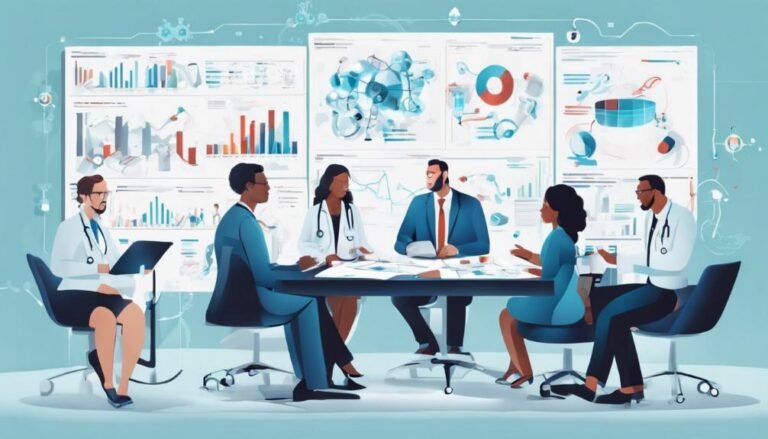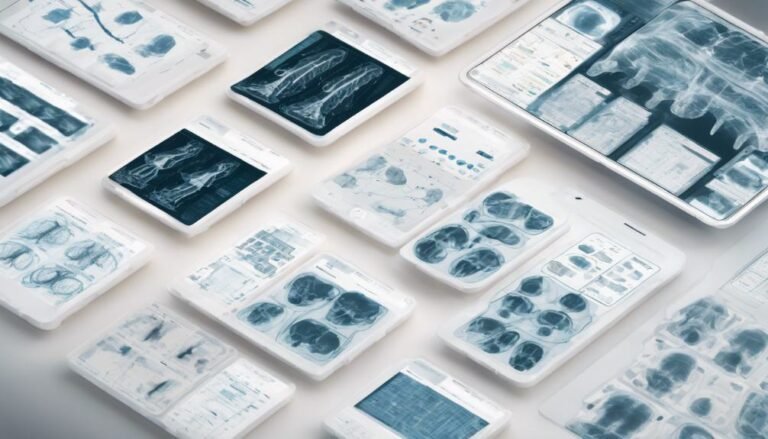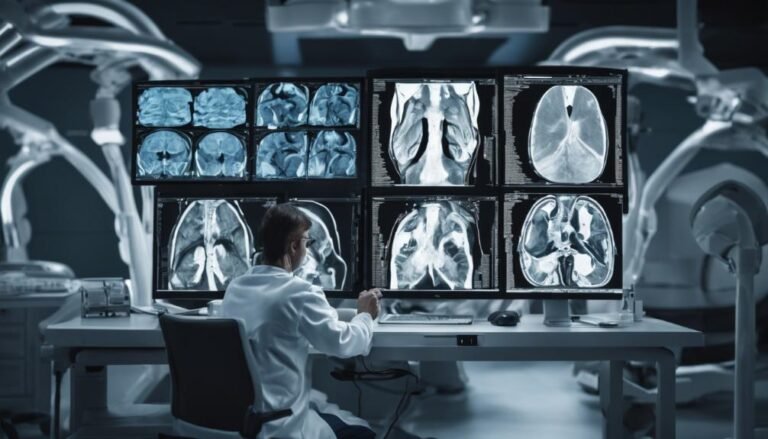AI in Global Health Security
In the domain of global health security, AI stands as a remarkable ally, reshaping the landscape of disease monitoring, prediction, and response strategies. Imagine a world where technology can foresee health threats before they even manifest, guiding interventions with unparalleled precision. The fusion of AI capabilities with public health initiatives holds the promise of not just addressing current challenges but also foreseeing and proactively mitigating future risks. As you ponder the potential implications of AI in safeguarding global health, consider the transformative power it holds in shaping a more resilient and proactive healthcare ecosystem.
Key Takeaways
- AI enhances disease surveillance for early detection.
- Machine learning predicts disease spread accurately.
- AI aids in efficient resource allocation for response.
- Predictive analytics forecast outbreaks for proactive measures.
- AI strengthens global health security through data-driven strategies.
AI Applications in Disease Surveillance
In global health security, AI plays a pivotal role in disease surveillance by swiftly analyzing vast amounts of data to detect and monitor potential health threats.
AI in pandemic preparedness involves utilizing machine learning algorithms to process information from various sources, such as social media, medical records, and internet search trends, to identify patterns indicative of disease outbreaks.
Machine learning in global health enables the creation of predictive models that can forecast the spread of infectious diseases based on factors like population density, travel patterns, and climate conditions.
Through AI applications in disease surveillance, public health authorities can enhance their ability to respond rapidly to emerging health risks, allocating resources more effectively and implementing targeted interventions.
By leveraging AI for pandemic preparedness, decision-makers can make informed choices regarding the deployment of healthcare personnel, distribution of medical supplies, and implementation of containment strategies, ultimately bolstering global health security efforts.
The integration of AI and machine learning technologies in disease surveillance represents a significant advancement in early detection and response capabilities, strengthening the world's defenses against infectious disease threats.
Enhancing Early Warning Systems
Utilizing advanced AI algorithms can greatly enhance early warning systems for detecting and monitoring potential health threats in global health security. AI in pandemic preparedness plays an essential role in predicting, detecting, and responding to emerging infectious diseases.
Technology in global health has the potential to revolutionize how we approach early warning systems, allowing for quicker identification of outbreaks and more effective responses.
AI can analyze vast amounts of data from various sources such as social media, news reports, and healthcare facilities to identify patterns indicative of a potential health threat. By swiftly recognizing these patterns, early warning systems powered by AI can provide timely alerts to authorities, enabling rapid response measures to be implemented.
The integration of AI in pandemic preparedness not only enhances the speed of detection but also improves the accuracy of risk assessment. This technology assists in forecasting disease spread, optimizing resource allocation, and ultimately strengthening global health security efforts.
Predictive Analytics for Outbreaks
Predictive analytics harnesses data-driven insights to anticipate and forecast potential disease outbreaks, enhancing proactive response strategies in global health security. Technology integration plays an essential role in this process, enabling the seamless collection, analysis, and interpretation of vast amounts of data from various sources.
Real-time monitoring of key indicators allows for the early detection of unusual patterns or trends, which is vital for timely intervention. Global collaboration further enhances the effectiveness of predictive analytics by facilitating the sharing of data, expertise, and resources across borders.
Data analysis lies at the core of predictive analytics for outbreaks, where sophisticated algorithms identify patterns and correlations that may indicate the emergence or spread of diseases. By leveraging historical data, current trends, and emerging risk factors, predictive analytics can help public health authorities make informed decisions and allocate resources proactively.
This proactive approach not only improves response times but also minimizes the impact of outbreaks on communities worldwide.
AI-Driven Epidemic Response Strategies
Sophisticated AI technologies play a pivotal role in shaping efficient and adaptive epidemic response strategies in the field of global health security. AI-driven response coordination leverages real-time data analysis to enhance decision-making processes during outbreaks.
By utilizing technology in epidemic response, public health surveillance systems can be greatly strengthened. AI algorithms can analyze vast amounts of global health data, identifying patterns and trends that aid in predicting and controlling epidemics.
Through AI-driven response coordination, authorities can streamline communication, resource allocation, and intervention strategies. This proactive approach allows for quicker response times and more targeted containment measures.
Additionally, the integration of AI in epidemic response enables the automation of routine tasks, freeing up valuable human resources for more complex decision-making processes.
In essence, the application of AI technologies in epidemic response strategies marks a notable advancement in global health security. By harnessing the power of AI for public health surveillance and global health data analysis, countries can better prepare for and mitigate the impact of infectious disease outbreaks.
Data-Driven Public Health Interventions
Data-driven public health interventions are essential in optimizing response strategies and mitigating the impact of infectious disease outbreaks. Remote monitoring plays a vital role in collecting real-time data on disease spread, symptoms, and healthcare utilization, allowing for timely interventions.
Through the use of advanced technologies, data can be analyzed in real time to identify trends, predict outbreaks, and allocate resources effectively.
Remote monitoring enables healthcare providers to track the progression of diseases and monitor patient health remotely, reducing the need for in-person interactions and minimizing potential exposure risks.
Real-time analysis of this data provides valuable insights into the effectiveness of public health interventions, guiding decision-making processes and enabling swift adjustments to control measures.
AI-Enabled Vaccine Development
AI-Enabled Vaccine Development harnesses the power of artificial intelligence to accelerate the vaccine creation process, vital in combating emerging infectious diseases. By leveraging AI, researchers can swiftly analyze vast amounts of data to identify potential vaccine candidates, greatly expediting the formulation stage.
Additionally, AI enables precise monitoring during clinical trials, enhancing safety and efficacy assessments, ultimately leading to faster and more reliable vaccine development.
Speeding Vaccine Development
Utilizing artificial intelligence to expedite vaccine development has shown promising results in enhancing the efficiency and effectiveness of the process. AI plays an important role in speeding up vaccine development by quickly analyzing vast amounts of data, predicting potential candidates, and optimizing clinical trial designs. This not only accelerates the identification of potential vaccines but also aids in understanding how viruses mutate and spread, which is essential for developing effective countermeasures.
One key aspect that AI-enabled vaccine development addresses is public trust and vaccine safety. By streamlining the identification of safe and effective vaccine candidates, AI helps guarantee that rigorous safety standards are met, fostering trust in the resulting vaccines.
Additionally, through enhancing regulatory approval processes and promoting transparency, AI contributes to the dissemination of accurate information regarding the development and testing of vaccines, further bolstering public confidence in the vaccination process. This transparency and efficiency in vaccine development are crucial for addressing global health security challenges effectively.
Precision in Formulation
Enhancing the precision in vaccine formulation through artificial intelligence involves optimizing the composition and characteristics of vaccine candidates for improved efficacy and safety. Data accuracy plays a pivotal role in this process. AI systems can analyze vast amounts of data with high accuracy, ensuring that the information used to formulate vaccines is reliable and up-to-date.
By incorporating data accuracy into the development process, researchers can make more informed decisions regarding vaccine composition, leading to higher-quality products.
Algorithm optimization is another key aspect of enhancing precision in vaccine formulation. AI algorithms can be fine-tuned to identify the most effective vaccine formulations based on specific criteria such as target population demographics or disease characteristics. Through continuous optimization, AI can assist in predicting how different vaccine components will interact within the body, allowing for the development of vaccines with optimal efficacy and safety profiles.
Enhanced Trial Monitoring
Monitoring vaccine trials is greatly improved through the integration of artificial intelligence, allowing for real-time analysis and enhanced decision-making based on accurate data.
Real-time monitoring enables researchers to track participants remotely, ensuring timely data collection and analysis. AI algorithms can identify patterns and anomalies in the data, flagging any potential issues for further investigation. This proactive approach enhances the safety and efficiency of vaccine trials by quickly addressing any concerns that may arise.
Remote tracking, facilitated by AI technologies, streamlines the monitoring process by reducing the need for physical presence, saving time and resources. Researchers can access real-time updates on participant health and vaccine responses, enabling swift adjustments to the trial protocol if necessary.
Improving Healthcare Delivery Efficiency
To enhance the efficiency of healthcare delivery, strategic utilization of AI technologies can greatly streamline processes and improve patient outcomes. Workflow optimization through AI algorithms can help healthcare facilities manage patient data more effectively, reducing wait times and enhancing overall operational efficiency.
By analyzing patterns in patient care, AI can assist in predicting patient needs, allowing for proactive interventions and personalized treatment plans that lead to better outcomes.
Moreover, AI plays an essential role in resource allocation, ensuring that medical supplies, staff, and equipment are utilized effectively. Through predictive analytics, AI can help healthcare organizations forecast demand, optimize staff schedules, and prevent shortages, ultimately enhancing cost effectiveness and reducing waste.
By automating routine tasks such as appointment scheduling and medication reminders, AI frees up valuable time for healthcare professionals to focus on delivering quality care to patients.
Future Prospects and Challenges
As you look ahead, consider the potential of AI in disease surveillance to revolutionize early detection and response systems.
Ethical considerations surrounding AI use in global health security will require careful navigation to guarantee fair and just implementation.
Additionally, the ongoing challenge of balancing the benefits of AI with data privacy concerns will necessitate innovative solutions to uphold individual rights while harnessing the power of technology for the greater good.
AI for Disease Surveillance
Employing artificial intelligence for disease surveillance presents a promising frontier in global health security, offering both opportunities and challenges for future implementation. Real-time monitoring enabled by AI can revolutionize disease surveillance by providing timely data for early detection and rapid response to outbreaks. Machine learning algorithms play an essential role in analyzing vast amounts of health data to identify patterns and trends that may indicate the emergence of diseases.
The use of AI in disease surveillance can enhance the accuracy and efficiency of detecting potential health threats, enabling public health authorities to take proactive measures to prevent the spread of infectious diseases. By leveraging AI's capabilities for predictive analytics, healthcare systems can better allocate resources and implement targeted interventions to mitigate the impact of outbreaks.
However, challenges such as data privacy concerns, algorithm biases, and the need for transparent decision-making processes must be addressed to ensure the ethical and effective use of AI in disease surveillance.
Moving forward, integrating AI into global health security frameworks requires a multidisciplinary approach to harness the full potential of this technology while safeguarding against potential risks.
Ethical AI Use
AI's integration into global health security frameworks necessitates addressing the ethical considerations posed by its use, particularly in the field of disease surveillance. Ethical considerations are paramount as AI technologies become more prevalent in health security, impacting decision-making processes.
To guarantee responsible AI use, implementing AI regulations that promote transparency in AI systems is essential. Bias detection mechanisms should be integrated to mitigate any prejudices that could influence outcomes in disease surveillance. Striking a balance between leveraging AI's capabilities for improved disease detection and ensuring fairness and equity in the process is critical.
Moving forward, one of the significant challenges lies in establishing universally accepted ethical guidelines for AI applications in global health security. These guidelines should encompass principles of fairness, accountability, and transparency to uphold ethical standards.
Additionally, promoting interdisciplinary collaboration between experts in AI, health security, and ethics is crucial to navigate the complex landscape of ethical AI use effectively. By addressing these challenges proactively, the global health community can harness AI's potential while upholding ethical standards in disease surveillance.
Data Privacy Concerns
Implementing strong data privacy measures is essential to address the future prospects and challenges surrounding AI integration in global health security frameworks.
Data encryption plays an important role in safeguarding sensitive health information from unauthorized access, ensuring confidentiality and integrity.
User consent is equally essential, as individuals must have control over how their data is collected, stored, and utilized in AI-driven health systems to uphold privacy standards effectively.
Incorporating ethical AI principles is critical to mitigate transparency concerns related to data privacy.
By designing algorithms that prioritize fairness, accountability, and transparency, the risks of bias or misuse of personal health data can be greatly reduced.
Transparent AI models allow for better understanding of how decisions are made, fostering trust among stakeholders and addressing concerns regarding data privacy violations.
As advancements in AI technology continue to shape the landscape of global health security, addressing data privacy concerns through robust encryption, user consent mechanisms, and ethical AI practices will be pivotal in ensuring the responsible and secure integration of AI in healthcare systems worldwide.
Conclusion
To sum up, AI's role in enhancing global health security is nothing short of revolutionary. By leveraging advanced algorithms and machine learning, AI enables rapid analysis of vast data sets to predict, detect, and respond to disease outbreaks.
The integration of AI technologies in public health interventions and vaccine development optimizes resource allocation and healthcare delivery efficiency.
As we navigate the future of global health security, embracing AI as a powerful tool is essential for addressing emerging health challenges and strengthening response capabilities worldwide.







